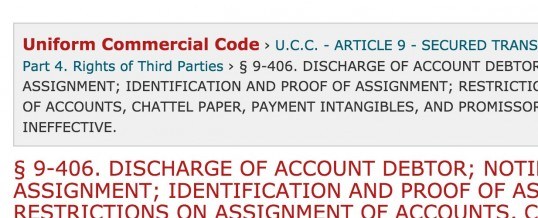The Article 9 Section 406 Notice

Your cash flow can be frozen immediately when an aggressive creditor serves your clients or customers with a demand letter pursuant to the Uniform Commercial Code (UCC) Article 9 Section 406 (“9-406 Notice”). Said creditor can assert in the 9-406 Notice that your receivables–your cash–is their rightful property, and insist that all funds be redirected to them.
Seldom do business owners want to meddle in the legal monetary disputes of others, so the result is often the same: they put the funds in escrow, stop doing business with the involved parties and wait for a court order to direct the flow of money.
This can immediately cut the legs out from under your business and destroy any hopes of getting back on your feet.
Bringing A Business to its Knees
Over the past year, Second Wind has noticed a considerable increase in these types of aggressive, predatory tactics on the part of Merchant Cash Advance creditors. The problem lies in the fact that it is just so easy for a creditor to send a 9-406 Notice. It doesn’t matter if they hold a subordinated or junior lien on the cash in question, nor are they required to file a lawsuit. They don’t need a court order or judicial permission to send a Notice; they don’t even need a lawyer to prepare it. Their system is very simple: when a borrower defaults, send the notice to every client and customer that they know of and hope that some comply. Unfortunately, they often succeed.
There are legal arguments and defenses that will shatter the legitimacy of these 9-406 Notices; however, they won’t solve the underlying issue of frozen cash. Remember, your client voluntarily froze the money until they are told to whom to allocate it, and you would have to hire counsel and invoke the legal process to apply the defenses that would defeat the effect of a 9-406 Notice. This process takes time and costs money, and you need your money now, not months down the road after an expensive legal battle.
A 9-406 Notice can bring any business to a screeching halt, while simultaneously straining or destroying customer relationships built over the years. It’s a scorched-earth approach to collections that leaves business owners feeling powerless. Without quick action and a proper strategy, there may be no way to recover.
Protecting Yourself
So what can you do to protect yourself from this type of collection effort? The answer depends on your specific situation, but there are a few things that you’ll need to assess immediately:
- How much money did the 9-406 Notice restrain?
- How much is frozen in the form of receivables versus credit card transactions?
- What is the seniority–or position–of the creditor who issued the notice?
The answers to the above questions will help determine how much leverage you have in the situation. If you have not taken any steps to prepare for this type of collection activity, you’re most likely going to be forced into entering an unfavorable settlement agreement with your creditor.
Just like any negotiation, entering into a situation where the other side has all the leverage not only creates a fragile position, but it can also stifle a business. That being said, we have successfully helped clients who have come to us with frozen accounts receivable, but it’s a time sensitive matter and your next step is critical. If your accounts receivable or merchant service provider has been frozen by a 9-406 Notice, contact us immediately. We will help you determine what your options are and how to get you through this financial storm.

